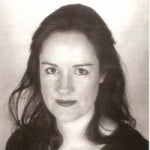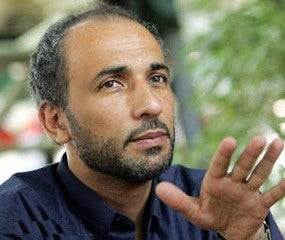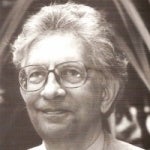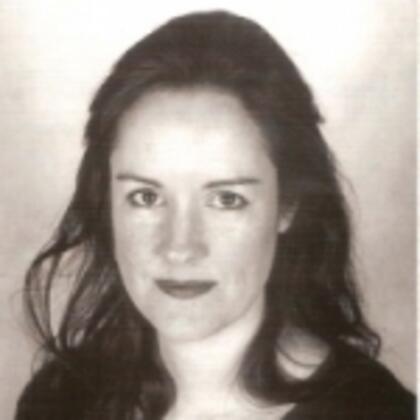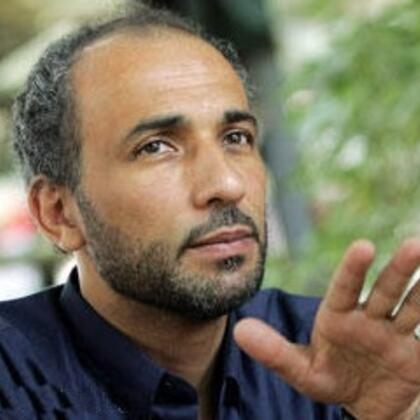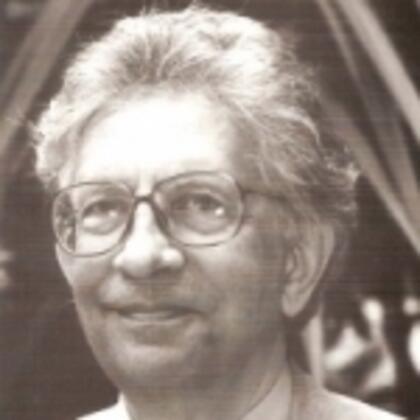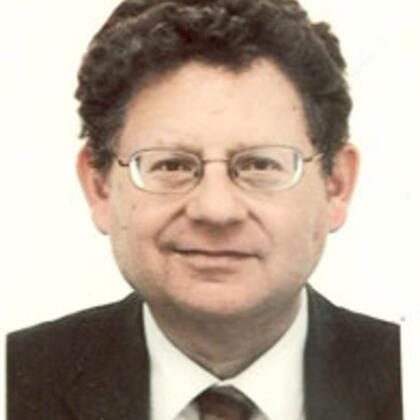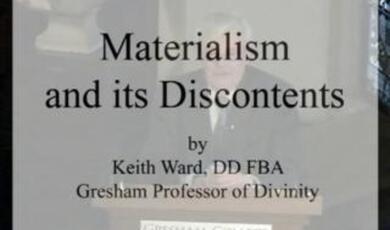Harmony from Diversity
Share
- Details
- Text
- Audio
- Downloads
- Extra Reading
The Lokahi Foundation carries out multi-faith research in religion and outreach projects for the community, public servants and other professionals. A group of distinguished speakers, including Professor Tariq Ramadam, spoke at this event.
Download Text
Harmony from diversity The Lokahi Foundation
Gwen Griffith-Dickson
Tonight is a function introducing the Lokahi Foundation, and I want to begin by thanking Gresham College and all its staff, who have been very supportive of the Lokahi Foundation in a number of ways, but not least in offering us an evening to come and tell you something of what we are about and share some of our vision and our projects with you.
Lokahi is a Hawaiian word. It means, roughly, something like “harmony through diversity”. Now, those being abstract nouns, that means nothing at all, I know, so I put a little picture of what one version of a lokahi might be on the back of our leaflet. That picture is taken in Hawaii, on the Big Island of Hawaii, and it shows an area that has been completely overrun, and you might think destroyed, by a lava flow. In all the black lava you can see no sign of life, except, coming up from the cracks of the lava, little ferns, whose seeds and spores have been blown in by the wind; they have taken shelter there in the crevice of the lava, and the rains come and they are watered, and the elements begin to break down the volcanic rock and turn it into what is in fact a very fertile soil. This combination of contrasting, or even conflicting, elements gives rise to the little ferns. When I was growing up in Hawaii, there was a place we used to call Desolation Trail, which looked like that, only worse, and greyer – cinders and ash and fragments of lava rock, with just a wooden walkway through it. When I was back there last year, it had grown – unless this was just in my head. I am admittedly older than I think I am, but just in one middle aged person’s lifespan, desolation has turned into rainforest. That principle - the reality that you see in nature and you see in environments, with different species coming together – is what the Hawaiians illustrated or labelled lokahi, and this particular concept is what we have taken for the name of our foundation.
What it tries to say is that you can have many things coming together that will never be the same, they will never persuade each other to turn into versions of themselves, they will never convert each other or reduce each other into something other than what it is, but by coming together in this way, even when it doesn’t always look cooperative, in the larger harmony, if you can take a larger vision of it and see it as a kind of creative clash or creative harmony of diverse elements, it does actually begin to create, in this case, new ground, literally, and in our case, we hope new ground figuratively.
So when, a year ago, I assembled various outstanding people, like the two you see before you and another in our front row who is not speaking tonight, and persuaded them of this vision as something new that we might create together, I did say I realise we cannot call it Lokahi. The combined views of the trustees and fellows was no, we must call it Lokahi. It does not belong to any one religion, no one will feel excluded; it belongs to Hawaiian religion, but no one takes offence at Hawaiians because they can’t really be a threat to anyone at the moment! Moreover, no one will have their associations to the word; you have got to explain the word every time you introduce yourself, so that way, you can actually get across what the real message is, and no one will be able to distort it, at least not on first hearing. That particular picture of this diverse ecosystem is a little parable, if you like, of what the Lokahi Foundation is about, and what we are about is bringing together people from diverse religious and cultural traditions, or people who perhaps are not themselves identified as religious, but are scholars in the field of some tradition or another. By bringing ourselves together, without having to persuade one another of the truth of our position or the rightness of our views, through this sort of ferment and this ecology of ideas and relationships, we do hope to be creating some new territory and some new ground.
In practice, what that means is that we come together and think and talk and write, or conduct research by ourselves or together, but we also have various directions of relationships and outreach. So for example, we relate to Government - we have at the moment a Home Office grant, we are doing research and shaping policy on areas to do with religion and society, and we have an advisory capacity to different departments and groups in Government; to business in the City, for example; and also directly to faith communities themselves. What we hope to be doing in the next academic year, a little later in 2006, is to be putting on more public events, where people can come and discuss and debate and share ideas and take part in the same lokahi of conversation and creation.
One of the projects that we are working on, for example, is a project for the Home Office, which we hope to be completing in the next couple of months. This we have called “What Works” - one of those snazzy titles that you hope will attract the funding, and happily, it did attract the funding! What we wanted to say with this project was it is all very well running about being anxious about faith communities, and certain faith communities, and particularly minority faith groups and ethnic groups, and worried about what is going wrong and what they should be doing, and what stance they should take, or what programmes, or which task forces, and which recommendations, but they haven’t actually got a vision or a clear picture of what success looks like in these cases. So what we have persuaded them to allow us to do is to go around and interview different groups of people in the community, from different ethnic or religious backgrounds, who are actually making a success of it, which may be financial, but in fact, the majority are not the self-made millionaires, though there are some of those, the majority of people who are just impressive for other reasons. It could social reasons, it could be the way that they mentor children that are seriously challenged or disadvantaged, it could be their charitable work, what they have organised, ways they have transformed their local communities or brought people together. So we are having an absolutely fascinating time hearing from these people, their stories. It is not research about statistics and what was their educational background; it is “tell me your stories”, “tell me what proverbs you were taught”, “tell me the stories your grandparents told you that motivated you”, and getting a very concrete picture of how these people have used strategies and insights from their faith or their background or their communities to enable them to make a go at it, often against the odds, and sometimes in a not very welcoming culture.
The next phase, after the Home Office report stage, is that we hope to be creating workshops and taking some of these insights to young people in different areas, to share some of these strategies and see how they can adapt them, see what kind of proverbs or insights or stories they can tell themselves to motivate themselves and give themselves a chance to succeed at what they think their vision is. So that is one example of the less theological and less abstract kind of work that we engage in.
Before I hand over to one of our other speakers, I just want to say a little bit about the academic side of our vision, and how lokahi translates into our philosophical approach, although it is going to differ of course for each of us – four academics, six opinions at least amongst us. We have eight fellows in all. Four of them are here now, and another will be joining us shortly.
One of these principles, taken from the picture of lokahi, is that diversity and difference in itself is a good thing. It is not just a means to an end. It is not just an unhappy fact that we have to put up with in a multicultural society. Difference and diversity is intrinsically good. That is, if you like, something of a faith statement, I can provide reasons why I think it is the case, and I think, at the end of the day, it is a faith statement, but I think it is there in nature, and nature chooses diversity. The more ranges of species, planet conditions, you have, the more resourceful your system is, the more resilient something is – if one solution or one insight breaks down, there is another there for you. That is one of the things I have found, personally as well as academically: if something breaks down for you personally in what you were raised to believe or your own cultural tradition, there is a brother or sister from another tradition there to share something from their world or their community that gets you back on your feet and gets you going again. So that is the first principle.
The other is that we make a mistake of thinking that diversity means this religion here and that religion there, and then that culture over there. Some of you who have had the misfortune to sit through my Gresham lectures will remember, over several years, me saying we do not have religions and civilisations like homogeneous blocks and monoliths, one civilisation clashing with another. There is internal diversity. Each religion, within itself, or each culture, is a lokahi, is a rich range of differing arguments, opinions, traditions, sources and texts. So it is not just diversity and difference between religions and cultures, it is diversitywithin cultures and religions.
Thirdly, that we had also make a mistake in thinking, well, Islam has developed here, and Judaism has developed there, and there is Christianity, which of course borrowed from Judaism, and they have all had their little pure traditions running along, and now they are all meeting each other and clashing because we have jet airplanes. There has always been an inter-faith world, and there has always been this contact between cultures. If you knew the history of 10 th Century of Baghdad, you would be amazed, and you would think, “Gosh, we are such barbarians compared to those civilised people!” The inter-faith discourse they had in that city a millennium ago was extraordinary. These religions have actually come about because they have shaped each other. We have created each other, and influenced each other throughout our history. We are who we are because of what the others are and how they have made us.
These are some of the themes that our other friends will be speaking about next. I want to introduce next Professor David-Hillel Ruben. His day job, as it were, is the head of New York University in London, and some of you may already be familiar with him. We are very pleased that he has joined us in Lokahi, but also very happy to have him here this evening to say a few words. Thank you.
Professor David-Hillel Ruben
I was not sure exactly what I should do this evening, and what I therefore have decided to do, in some state of uncertainty about what is entirely appropriate, is make just a series of general remarks and some general observations. I am not sure they all cohere together to a lovely little presentation – in fact, I am quite sure they don’t – and also, I don’t know if Gwen or Lokahi or anybody else would agree with everything I say, so you are hereby exempted from any responsibility if there is something I have said that is in conflict with the aims of the organisation. I don’t think so, but one never knows, so let’s try.
I suppose, like some of the people in Lokahi, and not like others, I both understand myself as a scholar of religions but also a participant in them. So I have a kind of a dual position in the way I think of myself. I reflected upon this a bit. It’s interesting…I come from two wonderful traditions of my own: one is the philosophical tradition, the tradition of analytic philosophy, and the other of course is Judaism, and in particular, I would define myself as an Orthodox Jew, not that anybody has given me any entitlement to speak on behalf of Judaism or Orthodox Jewry, and I may be making mistakes about that too, but I do understand my participation in Lokahi from that perspective, and I have reflected upon the odd fact that almost all the Jews involved in inter-faith work are non-Orthodox. Now, that’s not entirely true, some of you may well think of some very interesting and important exceptions to that rule – I can think of some – but in general that is true. It is very hard to get Orthodox Jews interested in any kind of inter-faith work, and I am going to go on in a minute to say that that’s not what lokahi is and that’s why I’m interested, but before I get there, I have reflected upon why that might be so, and I think some of these thoughts might help explain it.
First of all, a much more traditional Jewish attitude held by traditional Jews is just gratitude for being left alone. We have had at least 2,000 years experience in living in other people’s societies, in other people’s cultures, and being in fact dual nationals, nationals wherever you are, both of New York and Jerusalem, both of London and Jerusalem, both of Paris and Jerusalem, both of Rome and Jerusalem, both of Baghdad and Jerusalem, and Jerusalem being here not a place of course but a frame of mind. Having long experience of this diaspora and this diasporic position and not always having been treated with the greatest respect and dignity that man can imagine, I think that a very traditional attitude is simply gratitude of being left alone. Also, I think, about inter-faith work, there is an unclarity, and I think it remains an unclarity, about just what should be accomplished and indeed what can be accomplished by it, because, to tell you the honest truth, most religious Jews are not really very interested in what other people do or believe. I wonder if other faiths have that same phenomenon too. I really don’t – that’s not my own view. I have a first degree in philosophy and religion, which was mostly Christian theology, I am interested, but I think, reflecting on experience, most Orthodox just really aren’t interested. They don’t really want to tell other people what they believe either very much, unless they have to for reasons of self-protection. So in a world which is still full of websites which talk about the protocols of the elders of Zion or the ritual blood accusation, it’s very nice to be able to tell people that no, we don’t use blood to make matza on Passover, in case you happen to believe that, but other than that, we don’t assume that you are terribly interested in what we believe.
One thing I wanted to say was why I thought Lokahi was so different from that image of inter-faith activity, of which I have some respect but no terribly great interest in participating. I think Lokahi, so far as I understand from Gwen, has got a very clear agenda. It is clear what we try to do, what we can accomplish, and what we ought to accomplish. We don’t necessarily assume that any group is particularly interested in the details of what another group believes. I don’t assume in Lokahi that my Jewish friends are interested in the details of the debate about the nature of the Trinity, or indeed about the nature of Islamic law. That’s not what I think fuels the enterprise. Gwen is much better than I am at telling you what Lokahi does, but I am going to say a few words about that as well.
The importance to me for Lokahi is that we live in a society where the categories, first of all, even of the mainstream religions, do not fit other religions. The whole concept of a religion, for example, does not fit Judaism, and probably does not fit Islam either, so far as I understand it. There is no word in Hebrew for religion. We aren’t a religion, and so sometimes we feel out of place and somewhat out of focus because the categories that are brought to bear to understand us, and I’m sure others will feel the same, from other traditions, those categories just do not fit very well. But we also live in a society where most of the society does not understand religion anyway, because it has ceased being Christian, and indeed ceased being just about anything except consumerist some decades ago, maybe even longer, and so I think that there is a real task of understanding to which Lokahi can contribute. First, an understanding of what religion is – not using that in a narrow sense at all, but as applied to Judaism, Islam, Hinduism, and all the other groups I might be leaving out in that summary statement. The task of explaining religion, specific religions, and the idea of religion in general, is something that is very important in our very secularised society, and something we cannot take for granted.
I am reminded of a little story that a headmaster, a Jewish headmaster, of one of the City academies told me. A teacher came to him, someone from nominally a Christian, or perhaps just secular, background, because I don’t think one can distinguish that very much any more in most people, and said he thought that they should deny a Muslim girl who wanted to wear her head scarf, a right to wear her head scarf, because they had had a Muslim cleric in only recently who said it was unnecessary for Muslim girls to wear the head scarf. But he then reported to the Jewish headmaster that of course the Muslim girl said her Muslim cleric said she did have to wear one, but wasn’t this ridiculous when this other Muslim cleric said she did not have to wear one? The Jewish headmaster said to me, “I understood in an instant what was going on. He didn’t get it. I did.” It is the idea that you have within a religion the kind of diversity that Gwen alluded to, and that one religious leader will say “yes”, the other will say “no”, the third will say “maybe”, the fourth will say “a plague on all three of your houses”. This is something where the interpretation of the law is intrinsically complicated, and different people will have different views. “That’s the kind of thing I understood at once,” he said. Of course may be Christians understand that too, given the controversy in the Church of England over various matters recently, but I do not think secular people naturally understand those issues and those problems - certainly this teacher, who was going to be totally unsympathetic to this young lady until the Jewish headmaster intervened on behalf of the Muslim head scarf. I think that is a nice little indication of how much work there is to be done.
Lokahi is engaged in multi-faith research, on religions and on community issues, and that is part of the very clear agenda to which I certainly can sign up and which I think is utterly and importantly needed in this society. Lokahi describes itself as dealing with problematic situations, between religions or within religions, religious groups, and is dealing with them with objectivity backed by research. I cannot think of a task that is more necessary in today’s world. Finally, it says that it supports conflict resolution, reconciliation and peace-building activities. That is not just traditional inter-faith stuff; I think that is a goal that is highly desirable, and I know many projects already that Gwen is working on which further that and which is something I am so pleased and proud to have signed myself up to. Of course it is true that if Gwen Griffith-Dickson had organised the Charge of the Light Brigade, we would have probably followed her there too, because we have this utter confidence in what she does, but still, I have used my critical faculties to some extent, and I think that these are projects that are really terrific.
I wanted just to say a word about my own work, and I mean really just a word. My own interest is in the idea of traditions, and in particular religious traditions. What I think is interesting and worthy of note, and Professor Sorabji can correct me if he can think of some exceptions, is the amount of inattention that has been paid to this idea within the analytic tradition. There are certain blind spots in the analytic tradition, for perhaps sociological reasons; I’m not sure why. Tradition and culture are not the same by any means but not utterly unrelated ideas. There was a paper that intrigues me mightily. It was published in the 1950s, and it is not an unknown paper. It was written by a man called W. B. Gallie, who wrote a paper called Essentially Contested Concepts, which I am sure you know very well. He argued about traditions - religious, political and aesthetic traditions were his examples - and claimed that these debates between them and inside them were essentially contested and irresolvable. He gave a diagnosis of why that should be the case. I do not agree with the way he phrased the problems or the solution, but I think of him as a worthy mentor and a pioneer in a field that needs to be looked into.
I am very interested in my own work in developing a conceptual apparatus (as a good analytic philosopher) a conceptual apparatus in which to grasp and understand what goes on in these kinds of disputes within traditions. One group says it and not another group are the true successors, the real church, the true disciples, the others are not really a part of the same tradition. Some of this of course is just power struggle, and philosophers do not deal well with power struggles, but insofar as there is a normative aspect to these disputes and one can rationally and critically assess what is going on, I think that that is something I try to do in my own work: come up with the conceptual apparatus for evaluating disputes to see which, if any, are resolvable and which are irresolvable.
By the way, I think there are extraordinarily interesting analogies between what happens when traditions split and come together and change with what happens in the philosophical literature on personal identity, with people, splitting fusions and fissions of people, and I think that is also a very rich source for me of insight and illumination.
I am finished, but I just felt I could not leave the podium, without recommending that each of you read one of the greatest classics on traditions that has ever been written, and that is Walt Disney’s Grandpa Bunny-Bunny, and if you happen to know that lovely little story of Great-Grandpa Bunny-Bunny and how he hands down the tradition of painting all the little leaves various colours in the autumn, and teaches all the little succeeding bunny generations how to do this, you will have understood all you need to know about traditions!
Gwen Griffith-Dickson
Thank you very much. It goes without saying perhaps, but I will say it: if you believe that diversity is intrinsically good, what you are really saying is that traditions are somehow valuable, and that is what diversity means. It means preserving traditions so that they are still there for us to be diverse in the future.
The bad news is I am organising the Charge of the Light Brigade; I just keep forgetting to tell you when it’s starting, but that will be next time!
It is now my very great pleasure and honour to introduce our next speaker, Professor Richard Sorabji. I’m sure he is familiar to many of you if you have been attending Gresham lectures, because he has been the Gresham Professor of Rhetoric. You may not know that he is also one of the country’s greatest philosophers, certainly in ancient and classical philosophy, and it is a great honour to have him joining us, both in Lokahi and tonight.
Professor Richard Sorabji
I very much identify with the aims that Gwen has spelled out as the mission of Lokahi, and I was very grateful to her for asking me to be a research fellow of Lokahi, so I thought I would just tell you about the four bits of research that I am doing now to show how they bear on the aims of Lokahi.
Research I have been doing for a long time and continuing to do is about the transmission of philosophy from Ancient Greece to Medieval Islam. It is an extraordinarily fascinating story, and I do not think you can really master Greek philosophy, especially later Greek philosophy, fully if you do not work with the Islamic scholars. One very interesting thing happened in 529 AD. The Christian emperor closed the Greek School of Philosophy in Athens, and the Greek philosophers fled to the protection of the King of Persia. This was of course 529, before Islam had started. But the King of Persia was extremely interested in philosophy. He looked after these philosophers for 18 months in a palace whose frontage is still standing – it is in modern Iraq, rather near the fighting I am sorry to say, but a beautiful frontage. These Greek philosophers would have seen it every day, and we even know what they discussed with the King. I have only very recently discovered that one of the subjects they discussed with the King of Persia was an anticipation of a very, very famous argument, an argument which you find in Augustin, who had already lived and died, but most famously find in Descartes. It is called the Cogito. It is the argument that at least this much is certain: I think, I can’t be wrong about that, and I exist, I can’t be wrong about that and, furthermore, I cannot be wrong about what sort of being I am: a thinking being. Indeed, I can know even more than that: I can know that I am primarily a thinking being and not a physical being. Now, part of this argument, I have recently come to realise, was explained by one of these Athenians in 529 AD to the Persian King, and it may be this source which influenced Abyssinia, who produced a very similar argument after Augustin, but he could not possibly have got it from Augustin, because that Persian would never have read a Latin author, he would only have read Greek. He might have got his ideas, although he took them much further, from this person – Prisium was his name – who was rescued by the Persian King in 529 when the Christian Greek emperor did not want any more pagan philosophy to go on. We are now producing translations of this late Greek philosophy – we’ve produced 70 volumes – and one of the interesting things is that some of the ancient Greek philosophy is lost in Greek, and is now being discovered in Arabic translation, in medieval Arabic translation. So we are recovering the Ancient Greek theories from working with usually young Arabic scholars who are recovering these texts for us, and we are having a great conversation and we are publishing translations right now – there is one coming out this year.
Two of the most famous philosophers from this period of 529 were a Greek Neo-Platonist who was a Christian, and his enemy, in Athens, one of the ones who had to go off to Persia, who was appalled that Ancient Greek philosophy was being distorted for Christian purposes. The Christian was called Philoponus and the equally devout Pagan was called Simplicus. They are both wonderful thinkers. Philoponus produced some very famous arguments that Christianity must be right and Paganism must be wrong, that the universe had a beginning because God created it, and Islam, who inherited these ideas, thought that these were wonderful arguments. The argument, very roughly, was that all the Greeks agree you cannot go right through the whole of infinity, much less go through an infinity and add a bit more. Since all the Greeks agreed with that, all Greeks ought to agree with Christianity, that the universe must have had a beginning, otherwise how many years would it have gone through – more than a finite number? How many years by next year – infinity plus one? All you Greeks agree that is impossible, so Christianity must be right. It had been thought that was invented by Western Christians in the 13 th or 14 th Century. Rubbish! It was invented by Philoponus, one of my two late Greek philosophers, and handed on to the Christians by the Islamic world, who repeated these arguments again and again.
There is a wonderful continuation of the conversation by Islam, a continuation of the Greek philosophical conversation. When I look at Indian philosophy, which I have to admit I can only do in translation without any special knowledge such as the Greek gives me with Islamic texts, I find it very different in style, equally fascinating, but I never have the feeling “oh this Indian must have read this Greek” or “this Greek must have read this Indian”, whereas with Islamic texts, I am quite often able to say, even when the Arabists do not see it, I know exactly which Greek text this Muslim is replying to.
My second subject, which I looked at recently, was the ethics of war, and that is extraordinarily interesting because Judaism and Islam both studied as warrior societies, whereas Christianity, with its New Testament, started by saying “let’s turn the other cheek”. Some of the early Christian fathers, in the first three centuries, said Christians should be pacifists. It was Augustin who changed that. Augustin said, “No, look, it is incompatible, it is impossible to be pacifists. What we must do instead is to invent a theory of just war, of how to be just in war.” It is controversial, the idea of a just war, not always accepted in Middle Eastern capitals, but it was an attempt to show that war, though it must be fought, supposedly, can be fought on just lines, hopefully.
These warrior nations started with what I must say seemed to me rather bloodthirsty ideas, but that seemed so to them as well. So that in 1200, you get this wonderful Islamic philosopher, Avaroes, in a wonderful civilisation they created in Spain. Avaroes is saying: “lt is true that the Prophet said that polytheists should be killed,” but one view is that this was merely a historical statement about local polytheists. Even if it was not, Aristotle has taught us something, because he used Greek philosophy, namely that the law is a very general thing. The law has to make very general rules so it cannot look at the particular needs of the particular moment. Therefore, an important fact about law, which Aristotle explained very clearly, says Avaroes in 1200, is that judges must be given discretion. So if your local imam says, “Yes, that is all very good as a general law, but nowadays it does not pay any longer for Islam to think that all polytheists should be killed,” then it is the judge’s discretion that is more important than the law. Contemporaneous with Averoes, the Muslim in Spain, was the Jew who was a subject of the Muslim rulers in Spain, and he too wanted to soften the very bloodthirsty, I must say, rules about warfare that you find in Deuteronomy, especially Deuteronomy 20. You see, the sides were converging with each other: the warrior-like nations were trying to soften what was said, and the Christians were trying to harden what was said, so they converged in something of a midpoint about war. Amazingly enough, the Jew in 1200 described how he thought you should deal with conquered people, and it has been pointed out that his description on how to deal with conquered people was very like what those civilised Muslims were doing to Jewish Spaniards, which was not beating them up at all. They could not lead a political life; politically they were disenfranchised, but they were not persecuted in any way, and they were allowed to carry out their own religion.
Just one other thing on that subject: whereas Christianity made the fastest strides about when it is just to go to war, I think Islam was quicker, already by the 8 th Century, in getting off the mark about how to behave in war and how to avoid killing civilians, which was a very central subject they took forward faster than Christianity.
The third topic on which I am researching is this: I had the pleasure of listening to, quite recently, and reading a member of our House of Lords, Bhikhu Parekh, who wrote a wonderful book called “Rethinking Multiculturalism”, and this is something that we need to rethink right now in our own country. It is funny, I have the same experience as Professor Ruben, because I have just finished writing a book – it was proofed today actually – on Personal Identity, and I studied very carefully individual identity and human identity and, just near the end, through my visit to India this Christmas, I realised I had completely left out cultural identity. You see, what I discovered was that analytic philosophy which, like David Ruben, I have been steeped in, studies personal identity and human identity, but leaves out cultural identity. Two or three weeks ago, I went to the Social Science Library in Oxford, and there is book after book after book on cultural identity – nothing about human identity or personal identity. We are all too divided up in the academic world these days, and one of the good things about Lokahi is that it brings people together and makes you think about the things you have been overlooking.
Yes, of course cultural identity is very important. I have been thinking about Greek and Indian views on reincarnation. In the Hindu world, they discuss what would it be like to be reincarnated as a gnat – well, perhaps not very nice, perhaps a bit of a punishment for living badly, but they have all accepted the idea of living as a gnat. But what about being reincarnated as a non-Hindu? I have not seen anybody discuss that, but it is a horrifying idea, I would imagine! If there are any Hindus here, I would love to know their opinion, but you see how important it is to us whether we are Hindus what our culture is, and yet, how have we analytic philosophers been missing out the cultural identity which is as important as the other identities?
What Bhikhu Parekh says in his book is that he thinks we want to know not just why we should tolerate having other cultures in our own society, but why we should positively welcome it, and his answer is that it makes us more self-aware about the strengths and weaknesses in our own culture.
I think the Greeks and Romans had less trouble than we do about having a multicultural society. We in England have started to have trouble – we have got away with it for a very long time, but I think we have slightly stirred things up and we have brought a few troubles on our own heads. We are very lucky to have people who are thinking about it, like Bhikhu Parekh. In Greece, there was a wonderful writer – I do recommend him – in the 5 th Century, Herodotus, who wrote the most lovely history of Egypt and Greece and the Greeks who lived in what is now Turkey, and he just loved the differences in different cultures and wrote about how sensible they were and recommended a lot of them. A lot of them sound to me jolly good! They are all extraordinarily amusing. I very much recommended Herodotus’ histories. When I was a student, people thought it was not quite proper history; well, in that case, it is something better than history! He was a man who believed in multiculturalism, but things went a bit downhill after him in the 5 th Century BC. Nonetheless, I do not think the Greeks and the Romans had as much trouble as we are beginning to have now in England. Why not?
Well, you see, the Greeks lived in small city states. They did think the Scythians were about the most extremely uncivilised people, and of course foreigners like that were not allowed to be citizens in Athens, but they were given a very useful job: the Scythians were the policemen because they were very good with bows and arrows. So, true, they were not given political privileges, they could not vote, but Aristotle could not vote either, because he came from up the north in Macedonia, so it was not very unusual. They were not persecuted in any way. They were put to good work; they were the police force.
The Romans were really remarkable, because the Romans extended citizenship to absolutely everybody. When they conquered Italy, they extended citizenship to all the Italians. When they conquered the known world, they extended citizenship to everybody. At first they thought the Germans were beyond the pale, but once they had conquered them, they made them citizens. So they were giving citizenship to St Paul’s father, for example, he was a Jew, and when they got as far as Syria, they gave citizenship to Syria. Since they could not manage to conquer the Pantheons, only the Pantheons were outside the pale, so that they did not have to have under their empire anybody who was not a citizen. This was a considerable benefit, to be a citizen, and so then I think they just did not have the same cultural trouble as we are beginning to run into now. It is time that we thought a bit harder about this. I was very struck, in reading Bhikhu Parekh’s book, at how much has been done in India, a country whose problems of multiculturalism are far greater than anything we face here in England. I was very struck that, for example, laws against bigamy, which exist in England, are not applied to cultures which accept bigamy; they are simply not applied. In fact, the only law that is common to the whole of India is criminal law. Civil law varies with different cultures. Imagine the shock that would happen if that were suggested in England – unheard of! Well no, it is not unheard of. In a democracy far greater than England’s democracy, I mean far bigger, the biggest democracy in the world, namely India, that’s heard of. Bigamy here, not bigamy there – perfectly possible, but it is time we started thinking in England, time we started thinking.
Now to the very last subject on which I have done research, or I am doing some research. I hope to write a biography, but that is rather rash because I have never written anything like a biography before. I had an aunt, much loved, whom I remember greatly. All my Indian aunts used to come and explain to my mother how to bring up a son, because they did not have a son themselves. Fortunately, my mother took a broad view of these things! My aunt was the first woman lawyer in India or England, and after much opposition, which lasted life-long, to any woman being a lawyer, they finally agreed, the British Raj in India, that they needed one woman lawyer because there were families which owned huge estates, often rather crumbling, dilapidated estates, with no access to a lawyer because they were ruled by women who had to live behind the veil and could never see a man. Indeed, they could not even see women from their next door neighbours. So what went on in these houses? The British did not know. The British were all male. Nobody knew what went on, and yet the British were responsible for justice. Well, what went on was very often murder, because – and by the way, this applied – no Indians nowadays seem to know this, but in the first half of the 20 th Century, this applied to Hindus just as much as Muslims. Hindus in India of the higher castes, I should say of the sort of aristocratic classes, had rather followed the practices of the Muslims. Their women were behind the veil very often, and very often they had more than one wife, and murders were going on a great deal, because this mother wanted her children to inherit the estate, and that mother wanted that woman. The British could not poke their nose in, and no Hindu lawyers could poke their nose in either. No males could visit these women, and even the next neighbouring women, as I said, could not visit.
So my aunt had an absolutely unique access to what was going on. Of course, when she started to bring these women their rights, as she did, there were very strenuous efforts to murder my aunt, but she was a fairly vigorous woman and she always managed to escape, often by improvisation of a rather daring type at the last moment! She did make a prediction, and I wonder whether history has shown her right or wrong. On the face of it, history has shown her wrong. She told the British that they were making a very big mistake; they were making a very big mistake because they did not understand Orthodox Hinduism, Orthodox India. They were making arrangements, slowly, to hand over power to delightful Indians, who had been trained in Oxford and Cambridge, often Indians who were of a slightly secular frame of mind and were very far from being Orthodox Hindus. Many of them were Hindus - many of them were Muslims, highly, highly sophisticated. I must say, those Indian lawyers got the better of the finest minds in the British Cabinet. So it was all at a very high and very agreeable level. My aunt said, “Look here, it is all very well talking to this crème de la crème of India, but you know nothing, you British, about Orthodox India.” This aunt of mine, you see, spoke all the languages, she knew all the laws, Muslim law, all the different Muslim laws, all the different Hindu laws, of different areas, she spoke all the vernacular languages, and the British knew none of this. Unfortunately, my aunt was not a diplomat, I have to say that… She used to tell these British males, rather clearly, what they did not know, and this I think made her life very much harder than it need have been, but perhaps she would not have got so far if she had taken any advice from me!
Anyhow, she predicted that the handover of India would fail, because she said, “It is no good handing over to these highly sophisticated, very Westernised Indians who themselves do not know the first thing about Orthodox Hinduism any more than you do. So you are making a thorough mess!” Now, what happened? Well, amazing things happened. This practice of seclusion of women seems to have totally disappeared from Hindu India, because when I talk to modern Indians about how many women are still living behind the veil, they look amazed, and then they say, “Oh I suppose you mean Muslims.” “No,” I say, “I mean Hindus.” They have never heard of it. She was wrong in that it went away. Well, in a way, she was right: it was incompatible with the kind of Westernised democracy the British were bringing to India, and then when Nehru came along, amazement, amazement, he produced a secular constitution. So my aunt was in a way completely wrong: she could not possibly foresee a secular India, and yet she was right that a secular India was incompatible with this extreme Hindu Orthodoxy. Yet, Hindu Orthodoxy did not go totally away. The Nehru family were so successful with their secular constitution that until 1990 it prevailed, and you might have thought that old India was swept away. Now is that absolutely true, because remember, a very strong Hindu party came in in the 1990s – I don’t know if there are Hindus present in the room – but they did, rightly or wrongly, start rewriting the books for schools, rewriting histories. The most famous historian of India, a friend of mine, did lose her job there because she would not subscribe to a different view of history. What I heard Bhikhu Parekh lecture about on my last night in India, in February, was how he felt that India had had a very strong identity when it was struggling against the British Raj, a very strong identity, a secular identity, under Nehru and, in the 1990s, it had lost its sense of identity – it was split 50/50 between an Orthodox Hinduism, so perhaps my aunt was not 100% wrong.
Well, you can see I am very interested in just the things that Gwen is promoting the study of, not just the study of but doing something about. It is a moment when we need in this country to do something about it. Our task is very much easier than the task that India has been dealing with, undaunted, although it is very daunting. So I think this is exactly the right moment when we need Lokahi and the things that Gwen is doing.
Gwen Griffith-Dickson
Thank you, Professor Sorabji, for a marvellous and very stimulating contribution. Our last speaker is Professor Tariq Ramadan, who is from Geneva originally, a very well-known Islamic scholar who came over here roughly a year ago to join Lokahi full-time. So without any further ado, I will ask Tariq to come and share with us his vision…
Professor Tariq Ramadan
I will just say a few words about the kind of work I am trying to do from within and with the Lokahi Foundation. Hearing what was said about multiculturalism and inter-faith dialogue, I think it is really important to really set a very strong, heavy agenda about these kind of topics for now and for the future.
I have been trying to work from within the Islamic tradition, the roots of the Islamic tradition, for the last 20 years, and trying to come up with a better understanding of how we can deal with our strict resources in a contemporary world, not only in the West but also in the Islamic majority country, what we call the revival and new reading of the sources. Then of course, as we are living in the West, it is my strong opinion that what is going on in the West, here in the Europe, in the States, or in the Western countries, will have a tremendous impact on what is going on in the Islamic majority countries. What we are trying to do, coming to you with answers to new challenges, is really important. I was always thinking about the good aspect of this influence, and then came recently the cartoons issue, and you can see that if we cannot solve the problems, if you are not able to speak together, to speak with a reasonable approach, about freedom of speech, the way we tackle this, the way we are speaking as fellow citizens in our country, if we send this back to the Islamic majority countries, it is going to be instrumentalised in coming back to us in a very negative way, and it happens. So it is really important to understand what our responsibilities are in the West; the way we are working together, so when we speak abou harmony from diversity, it is exactly this: that we acknowledge the fact that we are coming from different religious backgrounds, we acknowledge that there are differences, and this is the starting point of all the discussion. But there is something which is important for us, to be able to have a positive impact in our societies in the West, but also to be able to send something which is a very strong message that we are experiencing something which is deep down in our understanding, in our hearts, in our conscience and minds: that we are dealing with something which we are building together, which is mutual trust. This is what is now missing among the fellow citizens in our country, and what happened just after July the 7 th, all the questions we had in this country. Before coming here – this was one year ago – what I heard was that we will never find a place where it is so easy to be a Muslim, and it was true. Then the questions we got just after July the 7 th, were about what is Britishness, who are the right and the true British people? It was very well tackled from the beginning. I think what happened in this country was and is great, as to the way the reaction was towards this multicultural project. This is true. It was not at all what happened in the States, even though after two years what we have in the city is now a better understanding of what we have to do together, but here we are dealing with issues, topics, where we have to build something which is mainly mutual trust and better knowledge. As it is said by the Lokahi Foundation, and this was the project of Gwen from the very beginning, it is work at different levels, within academia, and this should be done. But this work within academia, if it is not reaching the grassroots level, if it is not reaching the people, will not have any impact. So it is not professors and academics talking together; it is also to be able to reach the people, to reach out and to speak to the communities. So it is this, and it is also to be able to reach the organisations, even the Government. As it is an independent organisation, we should be free to speak to everyone freely and independently on all the issues. It means that out of this mutual trust, out of this objective, it is important to tackle all the sensitive issues, and here we are, yes, dealing from an Islamic viewpoint with something which is important. Richard Sorabji spoke about identity, and referred to the book Rethinking Multiculturalism. In every single Western country we have to think about that. What does it mean? Just words – multiculturalist - is it true that we are knowing each other better? Is it not the reality of a patchwork of communities? How could we change that, and not to be misled by very good realities at the local level but at the national level it could be difficult and different? The London reality is not the reality of the UK. It is not the same in all the cities. We do not have the people coming together. This reality of living in our own community, cultural communities or communities of faith, is a reality in our country, and I think that we have to be a leading force on that. It means that to be able, and this is the way I understand our commitment to Lokahi, to speak about secularism, to speak about multiculturalism, about identity. We have to spread a better knowledge of Islam. I want you to know more about Islam, not only to know about Averoes. It is really important, and you must understand why. Yes, Averoes was a great philosopher, but the perception in the West is that we know Islam through him because he is the closest to us, and it is not the knowledge of the other. The knowledge of the other is also to know about the one who is not like us, who is not speaking like us, who will say, yes, I refer to scriptural sources before referring to reason, for example, and who is far from quoting Aristotle, even though he is not far from understanding him.
So the point here is really to spread the knowledge of this diversity coming from a complex world. In fact Islam, the Islamic world, is as complex as the Christian, the Hindu and the Jewish worlds, and this is the starting point of knowledge, to spread this knowledge. When you spread complexity, you spread humility, and coming from an academic agenda, I think it is important.
There is something that we have to speak of today. We have to tackle the issue of violence, terrorism. It is really important to be able to do this; to be able to ask what is wrong with our teachings when we have people referring to our religion and killing? We should do that, but the way it was done sometimes was out of passions and just to accuse and to blame. It is a reasonable, academic approach that we need today. It was exactly the same with the cartoons issue recently, a lack of reasonable approach, and we have now people saying the West does not like Islam, and Muslims do not respect freedom of speech – as simplistic as that, and very dangerous. We have to work at the acdemic level but also at the grassroots, to spread a better understanding. We have to look at the issues of violence, secularism, multiculturalism, and women of course. I think that it is important to tackle all these issues and to be able to say, okay,how do you see it from your viewpoint and how can we build something together out of our trust, our mutual trust?
There is one thing which is important when I think we are working together, and I will conclude with this. It is that out of this trust when we are working together within the Foundation, the perception is, yes, we are coming from different worlds and we should show that it is possible to work together, and there is this mutual trust. One of our projects will be a very big topic in the years to come. It is about the relationship in the West between Jews and Muslims. It is an essential point for Muslims to be able to say we will never, never accept something like anti-Semitism in the name of Islam, it is absolutely not Islamic. To be able to say that we are not confusing between our concerns as to the Israeli-Palestinian conflict and what we are building as people from different faiths and building this mutual trust is really important. In many European countries there is a struggle between Muslims accused of promoting anti-Semitism, and Muslims accusing their fellow citizens or some Jewish lobby to promote something which is a new Islamaphobia. If we are going towards that direction, it is the undermining the whole process of living together, so I really think that there is something that we have to do here. It is our responsibility to be able to say we will never accept that. I am really insisting on mutual trust, and that means that I am able to ask you every single question which is in my mind, and you have to try to answer, because if I am just hiding questions, we will not move on, we will not change the reality. So at least these are the prerequisites and I really feel that within the Lokahi Foundation we are, at least on that ground, sharing these views and sharing these objectives.
Gwen Griffith-Dickson
Thank you very much to all my colleagues from the Lokahi Foundation, and thank you to all of you, and indeed to Gresham College again. I think that has illustrated our slogan, or tag-line, both the harmony and the diversities. We did not practise beforehand; it was very much a question of each person speaking from themselves whatever they wanted to say without an agreed script and, I think you will agree, there have been four very different approaches, but all coming together to form a shared core of understanding and mutual trust, to use Tariq’s phrase.
I woul just like to close with something from my own tradition and background. This was some advice given by Hawaii’s last king, King Kalakaua, and he was giving this advice to his wife, who was going to make an extremely dangerous, perilous and terrifying journey – she was coming to Britain, and she was obviously worried about the natives and the barbarians that she was going to encounter there and how she was going to cope. So her husband, the King, gave her some advice on how to cope in England, which was very useful to me 20 years ago:
Go carefully, and watch how you step;
Do not transgress (or, literally, do not push the boundaries too hard);
Do not rush into thinking you have understood;
And your best companion is empathy.
I think for us that could almost form our ethic. We do not have a rule book we have to sign up to, we do not have shared beliefs we have got to agree on, but we have a shared culture of respect. Watch where you step – you may not mind stepping there, but someone else does. Do not transgress someone else’s boundary. Do not rush into thinking you have understood, which I think is actually the most surprising line in a way. “Oh yes, we believe that too!” is one of the most annoying lines you can ever hear someone say, or “I know just what you mean” when you haven’t finished the sentence. It is the cultural version of that which I think is one of the things that Lokahi stands for, but also the last sentence – your best companion in this journey is empathy and compassion. It is not just a matter of emotion. It is not just a matter of sentiment or feeling. Being able to understand in order truly to empathise is a head matter as well, it is a cognitive skill that requires the qualities that were brought out this evening: the ability to step back and to see and to think and to listen. It is a lokahi of head and heart.
© The Lokahi Foundation, GreshamCollege, 9 March 2006
This event was on Thu, 09 Mar 2006
Support Gresham
Gresham College has offered an outstanding education to the public free of charge for over 400 years. Today, Gresham College plays an important role in fostering a love of learning and a greater understanding of ourselves and the world around us. Your donation will help to widen our reach and to broaden our audience, allowing more people to benefit from a high-quality education from some of the brightest minds.


 Login
Login
